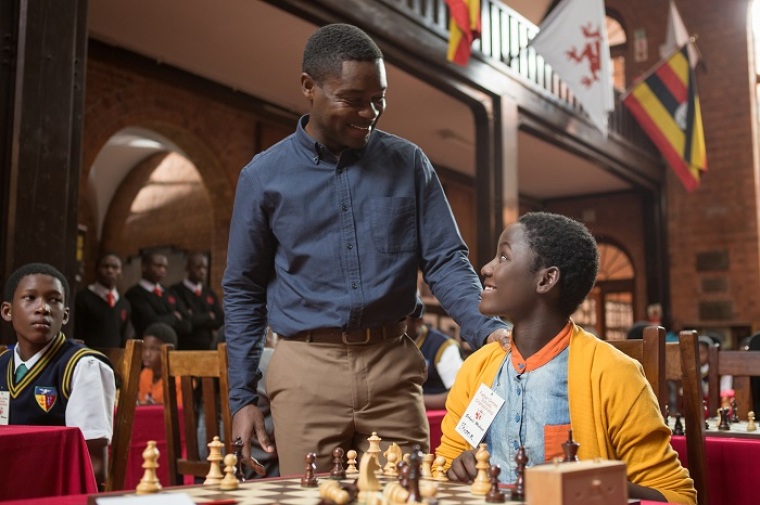'Queen of Katwe' star aims on bridging nations, shattering misperceptions

LOS ANGELES (Christian Examiner) – David Oyelowo has compiled a rich filmography during his 20 years in movies and television, but he also has become well-known for his portrayals of historical figures – from Corporal Ira Clark in Lincoln (2012) to Martin Luther King Jr. in Selma (2014).
Films, I think, are a primary means by which people can gain an understanding of history, and therefore, hopefully don't make the same mistakes again.
And while Oyelowo has his share of non-historical roles (he is Agent Kallus in the animated series Star Wars Rebels), he says there is something unique that attracts him to films based on real life.
"I'm drawn to movies that are saying something, that are meaningful, that hopefully can have some cultural impact," Oyelowo told Christian Examiner.
Oyelowo, who is open about his Christian faith, stars this weekend in Queen of Katwe (PG-13) another film based on a true story. Oyelowo plays missionary Robert Katende, who helps run a Ugandan sports ministry that attracts a girl named Phiona Mutesi, who was living in extreme poverty but became an international chess star.
"What [Katende] wants to give is love to kids who have been abandoned, who have been orphaned, who otherwise would not realize their potential," said Oyelowo, who was nominated for a Golden Globe for his Selma role. "For me, as a Christian myself, that's something I hugely admire, and a story and a character that I would like for the world to see and hopefully admire."
Fathers who have watched screenings, Oyelowo said, have left the theater saying, "I cannot wait to take my daughter to see this movie. I cannot wait to take my son to see this movie."
The Christian Examiner spoke with Oyelowo about the film and his role. Following is a transcript, edited for clarity:
Christian Examiner: You've been open about your faith and how playing Martin Luther King Jr. [in Selma] meant so much to you. Was that one reason you were so attracted to this film – you would be playing the role of a missionary who had such an amazing impact?
David Oyelowo: Obviously one is an incredibly famous activist who changed the world, but Robert Katende in his own smaller, humble and modest way is changing lives in a small part of Uganda, and the effects of that are permeating and expanding. I love the fact that you can look at an extraordinary man who did extraordinary things and you can look at an ordinary man whose effect is extraordinary on these young people.
The common theme both men have is an incredible level of self-sacrificial humility, which enables them to change lives. They're both Christians. Robert Katende works for the sports ministry, and that's the outlet through which he inspires and teaches these kids. And for him, chess is very much a means to an end. What he wants to give is love to kids who have been abandoned, who have been orphaned, who otherwise would not realize their potential. For me, as a Christian myself, that's something I hugely admire, and a story and a character that I would like for the world to see and hopefully admire.
CE: You also were in the movie Lincoln. Do you enjoy these types of historical films that are based on real people of history?
Oyelowo: I think what has happened with me is that I'm drawn to movies that are saying something, that are meaningful, that hopefully can have some cultural impact. I don't necessarily, when all is said and done, want my career exclusively made up of playing real people in historical films, but I think I'm drawn to them because – if they're going to get made – they often have something to say about us as human beings that is important.
But with Queen of Katwe, what I really love about that film is that it's one of the only films I know of that really shows Africa and Africans in a positive light. It is Ugandans affecting their own community for good. So often, when you see a film like this set in Africa, it's someone from the West who comes in to save them from themselves. That's just not true of African life, and as a Nigerian myself who lived in Nigeria for seven years, this is, to me a far more truthful representation of what that continent is and how resourceful the people of that continent are.
CE: So you want films you are in to entertain, but you want to be part of a film that actually moves people and motivates and impacts them.
Oyelowo: Films, I think, are a primary means by which people can gain an understanding of history, and therefore, hopefully don't make the same mistakes again. But also [they can] gain an understanding of who different kinds of people are, and realize that we are more alike than we are different.
For a young girl in California to be able to completely relate to Phiona Mutesi is a beautiful thing. For that American girl to be able to see herself in a Ugandan girl from a slum and to be able to relate to her story is very, very powerful. In the past, that continent could feel so far away that the temptation is to think they are not like me, and we are different, so therefore I have to come at them with maybe a degree of suspicion. Maybe I am being a bit lofty here, but I do think films can help break down some of those wrong perceptions.